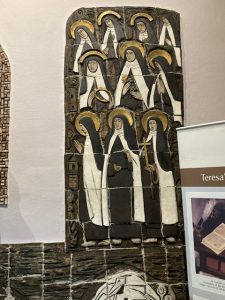
Yesterday was the feast of St Therese of Lisieux who died on the 30 September 1897 at just 24 years old. There are parts of her story which both inspire and disturb me. Both parents had failed religious vocations but all the Martin children ended up choosing religious life. I have wondered if there were an unspoken expectation that the Martin children would fulfil the failed hopes of their parents?
Therese entered Carmel at the tender age of 15 which was too young in my opinion. She had a consuming experience of vocation which in which the days she had to wait for permission to enter Carmel, felt like purgation. The motivation to dedicate her life to prayer for the sake of the world was significant part of her attraction to Carmel.
She was a soul who saw a higher purpose to her life that transcended the contemporary world in which she lived. She saw love as a core value to her vocation:
“To live in love is to sail forever, spreading seeds of joy and peace in hearts.”
She experienced a dark night of the soul in 1896 in which she struggled to believe in the afterlife and felt utterly deprived of divine consolation. Interestingly Mother Teresa of Calcutta experienced similar.
Hypersensitivity was a trait that caused significant suffering to Therese. In an article in the ‘Christian Century’ dated October 24, 2013, titled: Thérèse of Lisieux and mental health, by author John Blackman, he comments:
“Could her hypersensitivity have predisposed her to a mystical union, with an intensity and commitment that have set an example for others? Could her scruples, which can be seen as an unhealthy negation of self, have presaged her healthy self-denial in service to others, a virtue she often displayed in nearly invisible ways?”.
Our personality traits can become, through grace, wounds filled with light. The wounded healer is archetypally a powerful healer because they can fully empathise with wounds of others, and so go deeper with their healing.
My take away from Therese today is her tenacity used in her purposes of spiritual growth, especially her growth in love, which can speak deeply to people of many beliefs and traditions. Her capacity to remain with profound emotional discomfort and never giving up hope is an inspiration to us. Her dedication to the spiritual life despite the internal struggle is an example of never giving up. Her commitment to love is important. Love is the great gift of the divine that is our true nature and source of our being 
